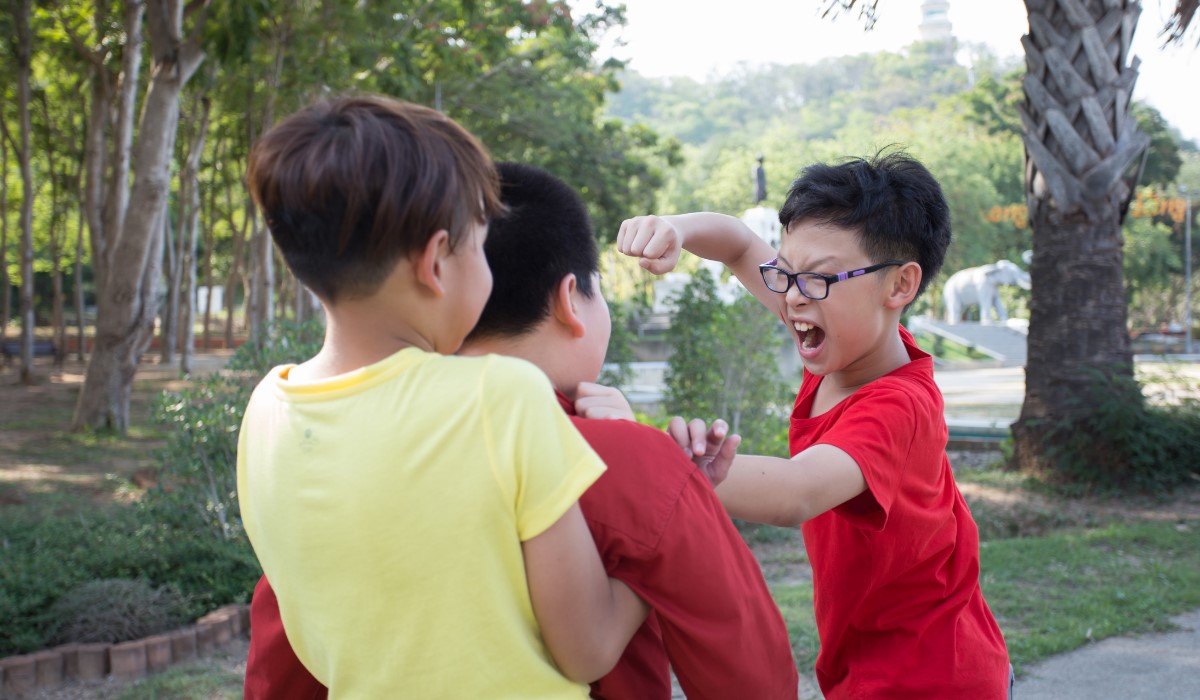As a parent, you’ll do anything to keep your little one out of harm’s way. So, when you see that someone hurts your child in any way, it’s extremely easy to go from 0 to 100 in a snap.
Your first priority before handling whoever hurt your child should be making sure your child is okay and feels safe. Explain to your child that it is never okay, in any circumstance, for anyone to hurt them or make them feel uncomfortable in any way. Once you’ve taken care of your child, you can take appropriate actions to make sure that that person doesn’t repeat the same action.
The actions you take when someone hurts your child depend on the context of how badly your child was hurt and who it was that hurt them. If a playmate took a swing at your child over a dispute regarding a toy, you wouldn’t react in the same way that you would if an adult yelled at or hit them.
Most Reasonable Actions to Take When Someone Hurts Your Child
If Another Child Hurts Your Child

If your child’s schoolmate or friend hurts them, figure out if it was an accident, a one-off incident, or a recurring issue.
If it was an accidental hit that happened while your child was roughhousing with another, check them over for any serious injuries and attend to these accordingly. Have both children make up, perhaps have them engage in safer play, and let them go on with their fun.
Children aren’t exactly known for having great self-control. Frustration over a game or dispute over a toy can easily result in a child taking a swing at another. Luckily, conflict between young children is easily diffused most of the time.
In a one-off situation where another child hurts yours out of the blue and the other child’s parents don’t intervene, you can step in. After you’ve checked to see that your child hasn’t been seriously hurt, talk to the other child and gently tell them that what they did wasn’t very nice and that they’ve made your child sad by doing it.
The responsibility of disciplining the other child falls on their parents. The easiest and often best thing to do is to talk to your child, talk to the other child and talk to their parents. Make sure that all parties get the chance to voice out their concerns and see what can be done to prevent the same thing from happening again.
If the same child starts hurting your child again or makes them feel unsafe or even afraid to go to places where they might be, you might need to start watching out for bullying. If all else fails, you may just need to end your child’s interaction with the other kid.
If a Sibling Hurts Your Child
It becomes a bit more complicated if the offending kid is a sibling. You need to first figure out what sparked the hitting and then see how you can stop the behavior.
Picking on or hurting a younger sibling could be over jealousy from having to share their parents’ attention with someone else. It could also be them trying to get you to shift your focus to them.
If this is the case, making your older child feel loved and secure in their relationship with you is probably the most important step to curbing the behavior. Spend an hour each day with a hundred percent of your attention on your older child, just to show them that they are loved and valued, even with a new sibling sharing your attention.
Give your child a place of importance in their younger sibling’s life. Allow them to help you out in taking care of their sibling. Have them help you put a hat on their younger sibling or rub lotion on after a bath. If your child is old enough to read, have them read to their younger sibling at playtime. Make a big deal out of what a good job they are doing at being a big sister or big brother.
Sometimes, siblings will fight and push each other’s buttons until someone snaps and strikes out. When that happens, calm them down first and give an appropriate consequence such as taking away video games until they can make up.
Help them work out a solution or compromise that they are both happy with. Congratulate them for making up and reiterate to both children that hitting isn’t an appropriate way of solving problems or getting their emotions out, even if someone makes them angry.
If an Adult Hurts Your Child

It’s hard to imagine a teacher and an institution you entrust your child’s safety to on an almost daily basis hurting them. Worse is that you probably won’t be there to see it happen.
Most countries have laws that prohibit schools from using corporal punishment to discipline children. With programs outside of school like children’s sports clubs and after-school groups, you may need to check with the organization to see what policies and penalties they have regarding both corporal and non-physical punishment.
If your child comes home from school one day and tells you that their teacher or coach hit them or called them a bad name, document it. Ask your child for details – when it happened, what happened leading up to the incident, and how many times it has happened. Ask your child to repeat to you exactly what the teacher said and pictures of any marks that may have been behind.
Take your concerns up with your child’s teacher and ask them if they can tell you more about what happened. Try to be as non-confrontational as possible and simply ask them to help you understand what your child is talking about. The issue may turn out to be something minor that you, your child, and the teacher can work out privately.
If you feel that the problem is something bigger or if the teacher seems dismissive or defensive, it comes time to take the problem up the hierarchy. Schedule a meeting with the teacher’s direct superior and bring all the documentation you have.
The instinct is to immediately jump to talking to the principal but doing so would probably just get you directed back down the ladder. You have a greater chance of getting the issue resolved quickly if you stay close to the problem.
Learn what you can about your child’s teacher. Accompany your child to school beyond just the carpool lane and talk to your child’s classmates’ parents. Volunteer at a few school events and go to the PTA and PTC meetings.
If you find that other parents share you and your child’s sentiment regarding the teacher in question, seek their support when you bring your concerns up to the teacher’s superiors. They will be less likely to ignore an issue when a larger group of parents are asking after them.
Some children may understandably not want to tell their parents when a teacher hurts them. They may genuinely believe that they were being bad, or they may be embarrassed to tell you what happened. That is why having a good line of communication with your child is extremely important.
Asking them a few open-ended questions about their day when they get home from school may clue you in on any trouble happening in school before problems escalate.
The Takeaway
No feeling is as infuriating as finding out that someone has hurt your child. When this happens, the first thing you should do before anything else is make sure they are okay and that there are no underlying physical injuries.
If someone hurts your child verbally, by yelling at them, scaring them, or shaming them, find a way to make sure they feel safe again. If your child has lingering fears or insecurities even after the ordeal is over, you may want to try seeing a therapist a few times to see if they can help your child find ways to rebuild their confidence and security.
If someone has hurt or has been hurting your child in a deliberate, serious way, causing serious physical (or psychological) injury, you may want to consider involving law enforcement in the situation.
Children may not always tell you when someone hurts them. They may have been scared into not telling, think they did something wrong, or think that you may get mad at them for it. Clear communication with your children is important from a young age.
Simply letting your children know that you will always be on their side and will always listen to them when they say something is wrong before an incident even happens will come a long way if it does happen.